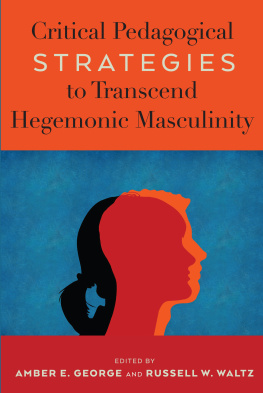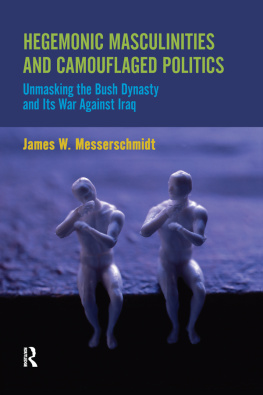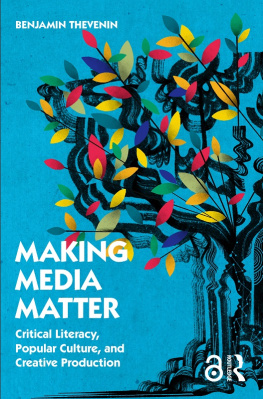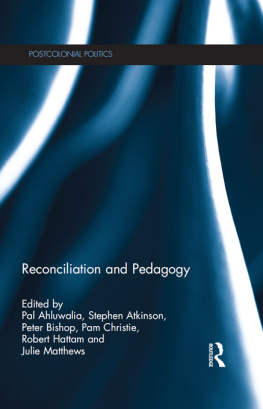Anthony J. Nocella II
Series Editor
Vol. 7
Critical Pedagogical Strategies
to Transcend Hegemonic
Masculinity
Edited by
Amber E. George
and Russell W. Waltz

Library of Congress Cataloging-in-Publication Data
Names: George, Amber E., editor. | Waltz, Russell W., editor.
Title: Critical pedagogical strategies to transcend hegemonic masculinity /
edited by Amber E. George and Russell W. Waltz.
Description: New York: Peter Lang, 2021.
Series: Radical animal studies and total liberation; vol. 7
ISSN 2469-3065 (print) | ISSN 2469-3081 (online)
Includes bibliographical references and index.
Identifiers: LCCN 2020033411 (print) | LCCN 2020033412 (ebook)
ISBN 978-1-4331-8337-9 (paperback) | ISBN 978-1-4331-8338-6 (ebook pdf)
ISBN 978-1-4331-8339-3 (epub) | ISBN 978-1-4331-8340-9 (mobi)
Subjects: LCSH: Critical pedagogyUnited States. | College
teachingUnited States. | College teachingMethodology. |
MasculinityUnited States. | Male domination (Social structure)United
States. | MenEducationUnited States. | Sex differences in
educationUnited States.
Classification: LCC LC196.5.U6 C748 2021 (print) | LCC LC196.5.U6 (ebook) |
DDC 370.11/5dc23
LC record available at https://lccn.loc.gov/2020033411
LC ebook record available at https://lccn.loc.gov/2020033412
DOI 10.3726/b17486
Bibliographic information published by Die Deutsche Nationalbibliothek.
Die Deutsche Nationalbibliothek lists this publication in the Deutsche
Nationalbibliografie; detailed bibliographic data are available
on the Internet at http://dnb.d-nb.de/.
2021 Peter Lang Publishing, Inc., New York
80 Broad Street, 5th floor, New York, NY 10004
www.peterlang.com
All rights reserved.
Reprint or reproduction, even partially, in all forms such as microfilm,
xerography, microfiche, microcard, and offset strictly prohibited.
About the author
Amber E. George, Ph.D., serves as Instructor of Philosophy and Cultural Diversity at Galen College. George has co-edited several books including Education for Total Liberation: Critical Animal Pedagogy and Teaching Against Speciesism (2019) and The Image of Disability: Essays on Media Representations (2018). She is the current editor-in-chief of the Journal for Critical Animal Studies.
Russell W. Waltz, Ph.D., Ed.D., serves as Assistant Professor of Philosophy at Galen College where he teaches courses in philosophy, critical thinking, and cultural diversity. He is the former editor-in-chief of Auslegung: A Journal of Philosophy. Waltzs interdisciplinary research focuses on examining the effects of implicit biases on critical thinking development and democratic discourse.
About the book
This book presents educational strategies for combating the harmful effects of hegemonic masculinity in the college classroom. The critical pedagogy presented in this book challenges some of the heteronormative tendencies present in the fields of media studies, literary studies, linguistic studies, philosophy, and critical thinking.
This eBook can be cited
This edition of the eBook can be cited. To enable this we have marked the start and end of a page. In cases where a word straddles a page break, the marker is placed inside the word at exactly the same position as in the physical book. This means that occasionally a word might be bifurcated by this marker.
iv | v
Table of Contents
Amber E. George and Russell W. Waltz
Crystal Benedicks and Adriel M. Trott
Jenn M. Jackson and Hilary N. Tackie
Jessica Ruth Austin
Purnur Ozbirinci
Russell W. Waltz
v | vi
Mria I. Cipriani
Zuzanna A. Jusiska
Emily Donovan
Camille S. Alexander
Stephen Ogheneruro Okpadah
Omar Swartz
vi | 1
AMBER E. GEORGE AND RUSSELL W. WALTZ
Critical Pedagogical Strategies to Transcend Hegemonic Masculinity goes beyond what many other critical pedagogy collections have contributed to the field of womens, gender, and sexuality studies since it brings together an entire collection of essays on practical critical pedagogical strategies for use in the classroom. An in-depth analysis of hegemonic masculinity is crucial to understanding how heterosexism and masculinity surfaces in the expanding interdisciplinary field of critical pedagogy studies. This collection is meant to make gender and sexuality visible so that educators can disrupt the hegemonic nature of masculinity; hegemonic masculinity is the normative ideal of manhood. As the Italian Marxist, Antonio Gramsci (1992) once stated, hegemony saturates what we think of as common sense as it becomes part of our lived system of meanings and values. We take as our foundation that gender is performative: gender is what you do, not as much who you are (Butler, 2004). Thus, the successful genders are learned by copying normative or hegemonic examples that are emulated generation after generation. We end up reprocessing familiar stereotypes of what it means to be feminine and masculine in the traditional sense while omitting what it means to be queer and nonbinary in gendered performances. This collection is intended to be a corrective to generate inclusive pedagogical approaches that avoid reinforcing gender inequities.
1 | 2
Sexism, heterosexism, and homophobia must be explored together as overlapping systems of oppression to demolish gender inequity. Sexism perpetuates rigid gendered stereotypes that keep men locked in patterns of masculinity that are toxic to not only women but also LGBTQIA+ members. Heterosexism denigrates and stigmatizes any non-heterosexual form of behavior, identity, or community, which also uses sexism to keep shallow gender roles firmly in place. Furthermore, homophobia or the irrational fear and hatred of LGBTQIA+ identity, people, or perceived LGBTQIA+ behavior further contributes to this destructive pattern. Masculinity describes the complexity of the male social position, identity, and experience as men differ according to their other social identities, including race, socioeconomic background, disability status, and sexual orientation. Men must adhere to masculinity at all costs, often at the expense of women, queer individuals, people of color, people with disabilities, and others whom they abuse in their efforts to measure up as real men. Men often get locked into a guide of tokenizing women to repel emasculation and accusations of being queer because the fear of appearing gay (homophobia) keeps men exaggerating their masculinity. To ensure that no one gets the wrong idea about them, men often resort to sexist and heterosexist behavior that harms, limits, and destroys the lives of all those in its path.












